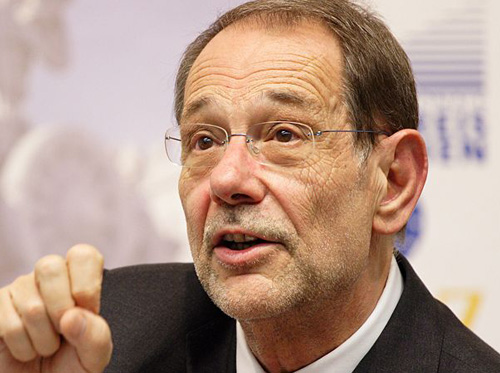The exclusive interview of Javier Solana, European Union High representative for the Common Foreign and Security Policy to Mediamax news agency, July 2003
- After 11 September 2001, the European Union and NATO began to speak about the increased role of the South Caucasus in the world politics and about the need to more actively support the countries of the region. Can we say today that the European Union is ready to realise some new initiatives in the South Caucasus? How urgent is the South Caucasus for the EU today?
- The Southern Caucasus region is a priority for the EU. As you know we have invested a lot of efforts on issues such as institutional, legal and administrative reform, private sector and economic development, infrastructure reform and environmental protection. In the past ten years the EU has given more than 1 billion Euro in grants only to the region. The Southern Caucasus region will stay high on our agenda.
- Despite such serious programs of the European Union, as TRACECA and INOGATE, Turkey and Azerbaijan refuse to realise projects, which assume Armenia's participation. Don't you think that the EU, which allocates huge means for programs of regional co-operation in the South Caucasus, should have a more strict control over the observance of "rules of the game"?
- The rules of the game, as you put it, are obviously complex in your region. The EU has all along been a staunch promoter of greater co-operation in the region, as well as between the region and the international community at large. That said, this is no easy task. But what the Southern Caucasus region really needs, if it is to become stable and prosperous, is to break away from the present situation and start building on confidence and co-operation. Whatever the EU can do to pull its weight in this process, we will do.
- All international organisations admit that the OSCE, through the Minsk Group, plays the main role in the process of settlement of the Nagorno Karabakh conflict. At the same time, opinions are voiced that this framework does not manage to resolve the conflict. Is it possible that the European Union will decide to get more actively involved in the resolution of conflicts in the South Caucasus?
- I highly regret that the Nagorno Karabakh conflict still waits to be resolved. The currently "frozen conflict" has the potential to destabilise the entire region at any time and puts distinct checks on positive development. The EU continues to support the OSCE in its endeavour to find a solution and stands ready to offer further assistance as appropriate. However, it has to be said that it is the parties, which have the primary responsibility to find an agreement.
- Is there anything else, besides unsettled conflicts, that causes EU's concern in the South Caucasus?
- The frozen conflicts in the region are at the heart of our concern, since they bring about so many negative side effects. That also means we pay a great deal of attention to conflict prevention. Other concerns stem from transitional problems that could arise in any country that has had to go through the tough process of reforms and state building. Some of our present preoccupations include rising levels of corruption, inefficient administration, weak institutions and unfavourable political and infrastructure conditions.
- How the internal contradictions of the EU-member states, caused particularly by disagreements on the Iraq issue and problems of provision of European security, can affect the policy of the European Union in the Caucasus?
- The Iraqi crisis has put great pressure, not only on the European countries, but also on the international community at large. I believe we are now at a stage when many of our differences are increasingly put to rest and replaced by a willingness to work together towards stability and reconstruction in Iraq. I think the possible implications for Southern Caucasus from these events should not be over-dramatised. The overarching trend is that the world keeps evolving and by and large is getting more and more closely tied together in inter-dependence and co-operation. In this process new interests and new priorities are set and the Southern Caucasus region, like all regions, has an important choice to make: to continue working to become a full partner in this process or to stay with the status quo and risk being left outside.
- Mr. Solana, you have been the head of NATO in the past. Regarding this, in your opinion, how realistic is Georgia's and Azerbaijan's striving for joining NATO within the coming few years, and can this bring to the formation of new division lines in the South Caucasus, taking into account close ties between Armenia and Russia?
- The new and constructive relationship between Russia and NATO means that we can dismiss talk of "new division lines" either in the Southern Caucasus or elsewhere. Whatever will happen in the future regarding the issue of Nato membership it will be part of the much wider picture of the continuously evolving international security landscape.
- What efforts should the countries of the region take for minimising the competition of Great Powers in the South Caucasus? Is it possible to find the "golden mean", which will allow the region to avoid new shocks?
- The security, stability and welfare of the region depend in part on the actions and attitudes of the countries of the region and in part on the actions and attitudes of actors outside the region. I can think of no better way of minimising the risks of negative outside influence and maximising real autonomy than through a genuine and sustained effort among the countries of the region to settle the disputes between them that give others the opportunity for influence.
- The OSCE and the EU have stated that the recent presidential elections in Armenia "fell short of international standards". Can this event have a negative influence on the relations between Armenia and the European Union in a short-term and long-term perspective?
- The EU took note with concern that the presidential and parliamentary elections in Armenia did not meet international standards. We will continue to urge the Armenian authorities to work towards improving its democratic shortcomings and stand ready to assist, together with other international organisations, in this process. The interests of Armenia and of the European Union will best be served by addressing those democratic shortcomings.


























